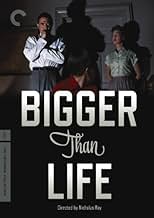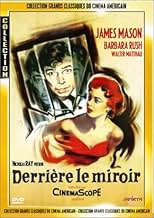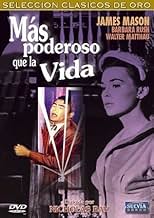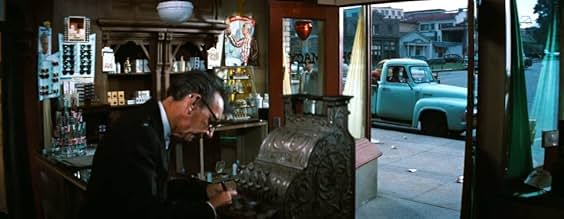ÉVALUATION IMDb
7,4/10
8,6 k
MA NOTE
Ajouter une intrigue dans votre langueA seriously-ill schoolteacher becomes dependent on a miracle drug that begins to affect his sanity.A seriously-ill schoolteacher becomes dependent on a miracle drug that begins to affect his sanity.A seriously-ill schoolteacher becomes dependent on a miracle drug that begins to affect his sanity.
- Prix
- 2 nominations au total
Robert F. Simon
- Dr. Norton
- (as Robert Simon)
David Bedell
- X-Ray Doctor
- (uncredited)
Gail Bonney
- Mother at PTA Meeting
- (uncredited)
Harold Bostwick
- Gentleman
- (uncredited)
Lovyss Bradley
- Churchgoer
- (uncredited)
Mary Carroll
- Mother at PTA Meeting
- (uncredited)
Virginia Carroll
- Mrs. Jones
- (uncredited)
Mary Carver
- Saleslady
- (uncredited)
Betty Caulfield
- Mrs. LaPorte
- (uncredited)
Avis en vedette
"We are dabbling in the unknown with dangerously potent tools." That is from the magazine article on which this film is based: "Ten Feet Tall," by Berton Roueché, from his brilliant "Annals of Medicine" series in The New Yorker (10 September 1955). Before I watched this Nicholas Ray film for the 2nd time, I read the original article and was quite astonished to find that the film is both faithful and unfaithful to the truth, and in surprising ways.
The most stunning thing is how quickly Ed (James Mason) is affected by the cortisone he is given to treat his rare and dire disease, a typically fatal inflammation of the arteries. I doubted that the derangement that made him feel "ten feet tall" would have happened as quickly as in the movie, which needs to get the plot going.
Well, I was wrong. The Long Island teacher on whom the article was based had a psychotic break almost as soon as he started taking the corticosteroid. The entire episode of his psychosis lasted only three weeks, but during that time, he was a terrifying presence. His threatening, dictatorial behavior toward his wife and son, not to mention his colleagues, were, yes, exaggerated for dramatic effect (especially the scorn he heaps on his wife), but Mason's portrayal is strikingly close to the real teacher's experience: the madly impulsive spending, the manic speeches and wild philosophical brainstorms, as well as his demand to be absolute ruler in his home and his unveiled contempt for everyone because they're all fools, except him.
James Mason, Barbara Rush, and Walter Matthau do solid work, as does Christopher Olsen, a child actor who also worked with Hitchcock, Cukor, and Sirk. Much has been said about Nicholas Ray's choices as director, and what interests me most is the ways he chose to be unfaithful to the original story.
First, location. Although the actual teacher lived in Forest Hills in Queens, "Bigger than Life" is set in a nameless suburbia, and it was filmed it in color for the big screen even though it's a domestic drama of the sort that was still shot in black-and-white at the time. Much has been made of those two choices, which are taken to be a commentary on stifling, conformist suburban lives in the 1950s. But I think Ray's decision to move it to a more typical American landscape than New York City, and to treat it as a big-screen color feature, had to do with the dramatic weight of the subject: drugs that save lives can cripple them at the same time, and the film has strong references to the deep shame that was (and to some extent still is) attached to mental illness. The wife won't even hear the word psychiatrist.
Second, the doctors. In the movie, Ed tricks doctors and druggists to increase his intake of cortisone-- if he feels ten feet tall on one pill, why not take two? In the true story, it was the doctor who increased the dosage, but did not schedule frequent follow-ups, even though he knew the risks from side effects. That's a much more damning situation than a mentally ill outpatient doubling his own dosage. So why shift the blame from doctor to patient in the movie? Here's a possibility: There was concern about blowback from pharmaceutical companies and/or the American Medical Association. But on the whole, I can see why "Bigger Than Life" has come to be so highly regarded, if not sufficiently well known.
The most stunning thing is how quickly Ed (James Mason) is affected by the cortisone he is given to treat his rare and dire disease, a typically fatal inflammation of the arteries. I doubted that the derangement that made him feel "ten feet tall" would have happened as quickly as in the movie, which needs to get the plot going.
Well, I was wrong. The Long Island teacher on whom the article was based had a psychotic break almost as soon as he started taking the corticosteroid. The entire episode of his psychosis lasted only three weeks, but during that time, he was a terrifying presence. His threatening, dictatorial behavior toward his wife and son, not to mention his colleagues, were, yes, exaggerated for dramatic effect (especially the scorn he heaps on his wife), but Mason's portrayal is strikingly close to the real teacher's experience: the madly impulsive spending, the manic speeches and wild philosophical brainstorms, as well as his demand to be absolute ruler in his home and his unveiled contempt for everyone because they're all fools, except him.
James Mason, Barbara Rush, and Walter Matthau do solid work, as does Christopher Olsen, a child actor who also worked with Hitchcock, Cukor, and Sirk. Much has been said about Nicholas Ray's choices as director, and what interests me most is the ways he chose to be unfaithful to the original story.
First, location. Although the actual teacher lived in Forest Hills in Queens, "Bigger than Life" is set in a nameless suburbia, and it was filmed it in color for the big screen even though it's a domestic drama of the sort that was still shot in black-and-white at the time. Much has been made of those two choices, which are taken to be a commentary on stifling, conformist suburban lives in the 1950s. But I think Ray's decision to move it to a more typical American landscape than New York City, and to treat it as a big-screen color feature, had to do with the dramatic weight of the subject: drugs that save lives can cripple them at the same time, and the film has strong references to the deep shame that was (and to some extent still is) attached to mental illness. The wife won't even hear the word psychiatrist.
Second, the doctors. In the movie, Ed tricks doctors and druggists to increase his intake of cortisone-- if he feels ten feet tall on one pill, why not take two? In the true story, it was the doctor who increased the dosage, but did not schedule frequent follow-ups, even though he knew the risks from side effects. That's a much more damning situation than a mentally ill outpatient doubling his own dosage. So why shift the blame from doctor to patient in the movie? Here's a possibility: There was concern about blowback from pharmaceutical companies and/or the American Medical Association. But on the whole, I can see why "Bigger Than Life" has come to be so highly regarded, if not sufficiently well known.
Nicholas Ray was one of the greatest directors to come out of Hollywood. His movies are always about something and that something has a cinematic flair that makes the experience thought provoking and thoroughly entertaining. Here is Cortisone the excuse for a slap in the face of a society that was getting more complacent and more spoiled with an avalanche of "new" things coming to overwhelm our daily lives. "We're dull, we're all dull" tells James Mason to his wife. Barbara Rush is superb as a Donna Reed type with a monster in the house. James Mason, a few years away from Lolita, also produced this rarely seen classic and gives a performance of daring highs. Highly recommended to movie lovers everywhere.
James Mason becomes "Bigger than Life" in this 1956 Nicholas Ray film that also stars Barbara Rush and Walter Matthau. Mason plays Ed Avery, a schoolteacher who also is a part-time cab dispatcher. He is suffering from severe spasms that are getting worse.
Ed learns that he has a terminal illness that perhaps can be cured with a steroid, cortisone. He is helped, but he also begins to suffer from mood swings and depression and, as he takes more and more, veers completely out of control. Barbara Rush plays his suffering wife, and Walter Matthau is a family friend and coworker.
I actually had a family member who went into profound depressions because of continuing to take black market cortisone, so this film resonated with me. Mason, who produced the film, is terrifying. Barbara Rush is very good, though her character puts up with an awful lot before she makes a move. Matthau is good in a supporting role, but roles showcasing his true strengths as an actor were a few years away.
This is much more than a cautionary tale about steroids, which need to be taken and tapered off very carefully. In his cortisone-induced mindset, Ed Avery spouts off on the problems in society, very unusual in the repressed '50s. His ideas are a tad over the top, but there's a good kernel in them. Ray always did well with a rebellious mindset.
Ed learns that he has a terminal illness that perhaps can be cured with a steroid, cortisone. He is helped, but he also begins to suffer from mood swings and depression and, as he takes more and more, veers completely out of control. Barbara Rush plays his suffering wife, and Walter Matthau is a family friend and coworker.
I actually had a family member who went into profound depressions because of continuing to take black market cortisone, so this film resonated with me. Mason, who produced the film, is terrifying. Barbara Rush is very good, though her character puts up with an awful lot before she makes a move. Matthau is good in a supporting role, but roles showcasing his true strengths as an actor were a few years away.
This is much more than a cautionary tale about steroids, which need to be taken and tapered off very carefully. In his cortisone-induced mindset, Ed Avery spouts off on the problems in society, very unusual in the repressed '50s. His ideas are a tad over the top, but there's a good kernel in them. Ray always did well with a rebellious mindset.
This film, much like the melodramas of Douglas Sirk, has far more going on than meets the eye. James Mason's character, after getting whacked out of Cortizone (a "Miracle Drug") indeed becomes hysterical and abusive. But he was made ill in the first place by the strain caused his intensely driven lifestyle, where he kept two jobs to finance his family's social and financial ascent.
What the viewer has to watch for is what his character says during his cortizone-induced delusions. His criticisms of his wife, kid, PTA and society in general are over-the-top, but essentially valid. It's a classic narrative device: by allowing a main character a way out of societal responsibility and place (In this case, being bombed on Cortizone), he is allowed to comment on and criticize American society directly without actually threatening the status quo. and in the case of 1950s America, that's a monolithic status quo to criticize.
What the viewer has to watch for is what his character says during his cortizone-induced delusions. His criticisms of his wife, kid, PTA and society in general are over-the-top, but essentially valid. It's a classic narrative device: by allowing a main character a way out of societal responsibility and place (In this case, being bombed on Cortizone), he is allowed to comment on and criticize American society directly without actually threatening the status quo. and in the case of 1950s America, that's a monolithic status quo to criticize.
Bigger than Life (1956)
Tightly made, vividly acted film about a contemporary crisis--the use and abuse of a new "miracle" drug. Watching James Mason suffer, and then make other people suffer, and then face the final bells of his life, is half the movie. He's such a uniquely subtle and powerful actor (at the same time), always filled with poise and a whiff of kindly diffidence.
In a way, this is a precursor to the recent movie idea in "Limitless," where a drug makes you "bigger than life," though this is no fantasy. The drug here is cortisone, ingested orally. It had been understood as a natural (adrenal gland) steroid hormone and was manufactured (by Merck) and on the market by around 1950. And by 1956 when this movie came out it was considered a new kind of penicillin, but rather than just be an antibiotic, it seemed to just make you stronger against all kinds of ailments, especially those that involved swelling of some kind.
Director Nicholas Ray does his usual wonders with interpersonal drama and makes this quite believable, as well as dramatic, and Joe MacDonald does his usual wonders with the camera-work. The writing, too, is crisp and believable (both Ray and Mason helped with the screenplay). In all, it's a top shelf production and a great story.
But it fails somehow to be a great film, and I think the main reason is the hook to the plot, about the wonder drug, is a little too neatly packaged, with a few scenes that are almost like public service announcements. We sort of know before we are "supposed" to know that it's going to go bad--the clues go beyond foreshadowing--and so when we find out we are right, the edge is off of the narrative. Only the very end is left hanging, though you figure, with Merck keeping an eye on things, that events really can't go too wrong. According to Wikipedia, the American response at the time was shock and the movie did poorly (I guess because it looked like an attack on the nuclear family, such was the 1950s).
But the critics loved it then and like it now. A movie this well made is still a thrill to watch for all the small things--Walter Matthau in a caricatured side role as the good Uncle, the psychological effects as manifest in Mason, and even the glimpse into the attitude toward medicine at the time. I don't think it's a typical reaction to cortisone, however (from what I've read)--this is a particular case where some inherent manic-depression is triggered, and exaggerated. It would be interesting to see this re-calibrated and filmed again in modern times, but with the subtlety here, the destruction of an ordinary family without shameless excess.
Tightly made, vividly acted film about a contemporary crisis--the use and abuse of a new "miracle" drug. Watching James Mason suffer, and then make other people suffer, and then face the final bells of his life, is half the movie. He's such a uniquely subtle and powerful actor (at the same time), always filled with poise and a whiff of kindly diffidence.
In a way, this is a precursor to the recent movie idea in "Limitless," where a drug makes you "bigger than life," though this is no fantasy. The drug here is cortisone, ingested orally. It had been understood as a natural (adrenal gland) steroid hormone and was manufactured (by Merck) and on the market by around 1950. And by 1956 when this movie came out it was considered a new kind of penicillin, but rather than just be an antibiotic, it seemed to just make you stronger against all kinds of ailments, especially those that involved swelling of some kind.
Director Nicholas Ray does his usual wonders with interpersonal drama and makes this quite believable, as well as dramatic, and Joe MacDonald does his usual wonders with the camera-work. The writing, too, is crisp and believable (both Ray and Mason helped with the screenplay). In all, it's a top shelf production and a great story.
But it fails somehow to be a great film, and I think the main reason is the hook to the plot, about the wonder drug, is a little too neatly packaged, with a few scenes that are almost like public service announcements. We sort of know before we are "supposed" to know that it's going to go bad--the clues go beyond foreshadowing--and so when we find out we are right, the edge is off of the narrative. Only the very end is left hanging, though you figure, with Merck keeping an eye on things, that events really can't go too wrong. According to Wikipedia, the American response at the time was shock and the movie did poorly (I guess because it looked like an attack on the nuclear family, such was the 1950s).
But the critics loved it then and like it now. A movie this well made is still a thrill to watch for all the small things--Walter Matthau in a caricatured side role as the good Uncle, the psychological effects as manifest in Mason, and even the glimpse into the attitude toward medicine at the time. I don't think it's a typical reaction to cortisone, however (from what I've read)--this is a particular case where some inherent manic-depression is triggered, and exaggerated. It would be interesting to see this re-calibrated and filmed again in modern times, but with the subtlety here, the destruction of an ordinary family without shameless excess.
Le saviez-vous
- AnecdotesThe main manufacturers of cortisone at the time, Merck in the US and Glaxo in the UK, were worried about the impact of this film on the public and their willingness to take the drug if prescribed by their physician. However, by the time of this film's release, newer and better formulations of the drug, along with greater knowledge of its uses and limitations had reduced (but not eliminated) the side-effects experienced by Ed in this film.
- GaffesWhen Ed has a barium X-ray, the image of the swallowed fluid is anatomically inaccurate. The fluid falls straight down to an extremely large "stomach" in his groin area.
Meilleurs choix
Connectez-vous pour évaluer et surveiller les recommandations personnalisées
- How long is Bigger Than Life?Propulsé par Alexa
Détails
- Date de sortie
- Pays d’origine
- Langues
- Aussi connu sous le nom de
- Derrière le miroir
- Lieux de tournage
- société de production
- Consultez plus de crédits d'entreprise sur IMDbPro
Box-office
- Budget
- 1 000 000 $ US (estimation)
- Durée1 heure 35 minutes
- Couleur
- Rapport de forme
- 2.55 : 1
Contribuer à cette page
Suggérer une modification ou ajouter du contenu manquant

Lacune principale
By what name was Bigger Than Life (1956) officially released in India in English?
Répondre






























